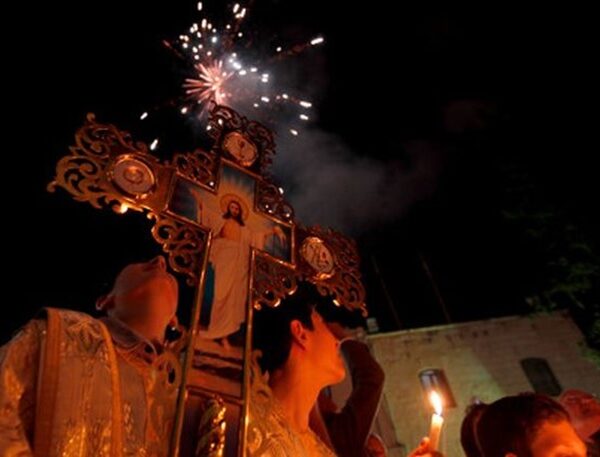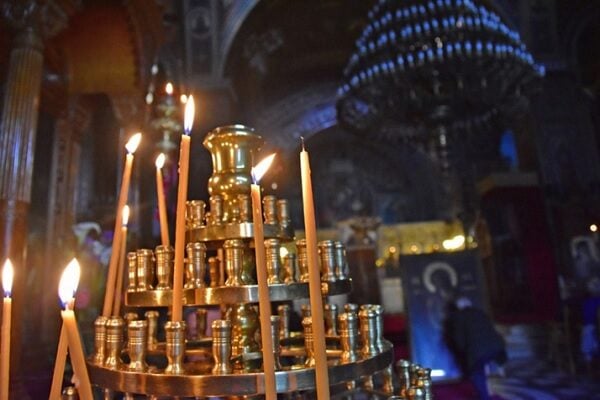Renewal Week, the brightest and most resurrectional week of the year
20 April 2023My dear readers, CHRIST HAS RISEN! After Great Lent, we entered Holy Week, and after Easter Sunday (the evening of Great Saturday) we’re now into the ‘Rose’ Triodio, that is the period of the Pentikostario (the book of Pentecost). This is the preeminent time of the resurrection in the Church and lasts until the Sunday of All Souls.
The first week of the Pentikostario, that is the week from the Sunday of Easter until the following one, Thomas Sunday, is known as Renewal* Week, obviously because it indicates the new reality in our lives, brought about by Christ’s abolition of death and his resurrection. Apart from that, in the years of the Early Church there was also the order of the catechumens, that is those who came from the ranks of the pagans or Jews and had been taught the truths of the Christian faith in order to become members of the Church through the sacrament of baptism. In those days, holy baptism, like the other sacraments, wasn’t a private affair, nor even a family event, as it has unfortunately become today. It was an event which concerned the whole congregation and body of the Church.

The catechumens, particularly those who were at an advanced stage of their novitiate and instruction for holy baptism, were baptized all together on the night of Great Saturday, before Easter Sunday, and were then called ‘newly-illumined’. At baptism, at the triple immersion in the blessed water in the name of the Holy Trinity, the former person, the person of sin ‘dies’ and the new one ‘is born’, renewed, fresh, someone who experiences rebirth and renewal.
This is why, from the practice of the Church, the week after Easter is known as ‘renewal week’, or ‘white week’, because the newly baptized and illumined members wore white clothing for the whole week and attended church in this raiment of body and soul, since, as we all know, baptism expunges all the sins people have committed before that point in time.
Apart from their common characteristics, the seven days of Renewal Week are considered to be ‘one day’, Easter Sunday. Or, to be more accurate, like the 8th day of the week and of creation, which the holy Fathers of the Church understand as that state which will begin with Christ’s second coming and which will be timeless and endless.
According to canon 66 of the Sixth Ecumenical Synod, the faithful should celebrate with spiritual joy, singing psalms and hymns, not engaging in dances and entertainments. They should participate in the services of the Church, taking communion every day, even though they’ve eaten well the previous day, given that that there’s a general dispensation and that they’ve risen with Christ. The mournful nature of the Lenten offices, the genuflections and prostrations, have no place in the event of the resurrection; they are simply part of our preparation for it. ‘During renewal week we may eat meat freely on Wednesday and Friday; for this seven-day period is considered one Lord’s day’.
Throughout Renewal Week the Easter service is sung, without the Midnight Office and the ‘Come, take the light’, which is a later custom and one not mentioned in the printed Pentikostario. It derives from the service of the Holy Light in the Church of the Holy Sepulcher in Jerusalem. Similarly, Saint John Chrysostom’s Easter sermon is omitted, being read only on Easter Sunday itself.

Of course, an obvious question is: ‘That’s all very well, but given that the institution of the Catechumens has virtually ceased to exist, why do we still celebrate Renewal Week every year?’. A lot of people would say: ‘For historical reasons’. The Church has a memory, but it doesn’t live with the past in the past; its dynamic and perspective come from the future… Christ’s second coming. So the reason for the celebration of Renewal Week is purely spiritual. How and why? Because of our sins, we’ve stained the white garment of our baptism within us and so we need repentance if we’re to become temples of the Holy Spirit.
As Saint Paul says: ‘Let us walk in newness of life’ (Rom. 6, 4). So we need renewal, rebirth, renovation. One of the hymns says: ‘Become new, brethren, and when you have left behind the old person, live the new life’. As the hymnographer says elsewhere: ‘Return to yourself. Instead of old, become new and celebrate the inauguration of your soul. While there is still time, may your life be reborn’. So, for the faithful, Renewal Week is an occasion for spiritual fruitfulness and a change for the good. It means the denial of the old person, that is the one related to sin, decay, the passions and death itself. Let’s experience this life, my brothers and sisters, when we thunder with all the power of our soul:
CHRIST HAS RISEN – HE HAS RISEN, INDEED, MY BROTHERS AND SISTERS.






